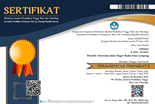Hubungan Antara Pola Asuh Permisif Dengan Kepercayaan Diri Remaja
Abstract
Confidence is a condition about a person's beliefs that look at him positively and can reach something he wants without any doubt. This study aims to determine the relationship between permissive parenting with adolescent self confidence in SMP Negeri 35 Bandar Lampung. The hypothesis proposed in this study is that there is a relationship between permissive parenting with adolescent self confidence in SMP Negeri 35 Bandar Lampung. The subjects of this study were adolescents of class VIII at SMP Negeri 35 Bandar Lampung in the academic year 2019/2020, taken using a purposive sampling technique. This study uses a data collection method in the form of a psychological scale, namely a confidence scale of 31 items (α = 0.889) and a permissive parenting scale of 30 items (0.929). The collected data were analyzed using the product moment analysis technique from Karl Pearson assisted with SPSS 22.0 for windows. The results of data analysis showed that rxy = 0,600 with p = 0,000 (p <0.01). This shows that there is a very significant relationship between permissive parenting with adolescent self-confidence, so that the hypothesis is accepted. These results make an effective contribution of 0.360 or 36%. In other words, the permissive parenting variable contributed 36% effectiveness to the variable confidence.
Keywords: Self Confidence, and Permissive Parenting
Keywords
Full Text:
PDFReferences
Azwar, S. (2015). Metode Penelitian. Yogyakarta : Pustaka Pelajar.
. (2016). Reliabilitas dan Validitas Edisi IV. Yogyakarta : Pustaka Pelajar.
Baumrind, D. (1991). Effective Parenting During The Early Adolescent Transition. In P.A. Cowan & E.M. Hetherington (Eds.), Advances in Family Research (Vo. 2). Hillsdale, NJ: Erlbaum.
Bénabou, R., & Tirole, J. (2002). Self-Confidence and Personal Motivation. The Quarterly Journal of Economics, Vol. 117, No. 3. Oxford University Press. (Diakses pada tanggal 1 April 2019 pukul 17:51:50 di http://www.jstor.org/stable/4132491).
Dagun, S.M. (2002). Psikologi Keluarga. Jakarta : Rineka Cipta.
Departemen Agama RI. Al-Qur’an dan Tafsirnya, (Edisi Yang Disempurnakan), (Jakarta : Lentera Abadi, 2010), jilid X, hlm. 203
Djamarah, S.B. (2018). Pola Asuh Orangtua dan Komunikasi dalam Keluarga Edisi Revisi. Jakarta : Rineka Cipta.
Dariyo. (2007). Emotional Parenting. Yogyakarta : Nuansa Aksara.
Fathi. (2011). Mendidik Anak dengan Al-Qur’an Sejak Janin. Jakarta : Coasis.
Fatwati, A.M. & Fakhruddiana, F. (2018). Kecenderungan Pola Asuh Permisif dan Kepercayaan Diri dengan Motivasi Berprestasi pada Siswa. Jurnal Humanitas Vol. 11. Universitas Ahmad Dahlan. (Diakses pada tangal 20 Februari 2019 pukul 16:47:10 di http://journal.uad.ac.id/index.php/HUMANITAS/article/view/2323).
Ghufron, M.N., & Risnawita, R. (2012). Teori-Teori Psikologi. Yogyakarta : Ar-Ruzz Media.
Habibi, M. M. (2015). Analisis Kebutuhan Anak Usia Dini (Buku Ajar S1 PAUD). Yogyakarta : Deepublish.
Hakim, T. (2002). Mengatasi Rasa Tidak Percaya Diri. Jakarta : Puspa Swara.
Hidayat, K., & Bashori, K. (2016). Psikologi Sosial : Aku, Kami, dan Kita. Jakarta : Erlangga.
https://www.merdeka.com/sehat/anak-perempuan-indonesia-krisis-percaya-diri.html. Diakses 28 Februari 2019 pada 20:49
https://www.liputan6.com/health/read/3468992/kepercayaan-diri-remaja-perempuan-indonesia-masih-rendah-apa-solusinya. Diakses 28 Februari 2019 pada 20:55
https://health.detik.com/anak-dan-remaja/d-2986437/minder-anak-bisa-lukai-diri-sendiri-dan-bunuh-diri . Diakses pada 28 Februari 2019 pada 21:44
Hurlock, E.B. (2004). Psikologi Perkembangan : Suatu Pendekatan Sepanjang Rentang Kehidupan. (Istiwidayanti & Soedjarwo, Penerj.). Jakarta : Erlangga.
. (1976). Personality Development. New York: McGraw-Hill Education.
Ishak, Z., Low, S.F., & Lau, P.L. (2012). Parenting Style as a Moderator for Students' Academic Achievement. Journal of Science Education and Technology, Vol. 21, No. 4. (Diakses pada tanggal 1 April 2019 pukul 19:56:08 di http://www.jstor.org/stable/41674476).
Kurniawan, A. (2018). Pengaruh Pola Asuh Permisif terhadap Rasa Percaya Diri Siswa Kelas V. Jurnal Pendidikan Guru Sekolah Dasar Edisi 14. Universitas Negeri Yogyakarta. (Diakses pada tanggal 27 Februari 2019 pukul 16:50:41 di http://journal.student.uny.ac.id/ojs/index.php/pgsd/article/view/10990).
Kurniawati, E., Rosra, M., & Utaminingsih, D. (2017). Hubungan antara Pola Asuh Orang Tua dengan Percaya Diri Siswa. Jurnal Bimbingan Konseling. Universitas Lampung. (Diakses pada tanggal 27 Februari 2019 pukul 21:42:05 di http://jurnal.fkip.unila.ac.id/index.php/ALIB/article/download/14402/10494).
Lie, A. (2003). Menjadi Orangtua Bijak : 101 Cara Menumbuhkan Percaya Diri Anak. Jakarta : Gramedia.
Papalia, D.E., Old, S.W., & Feldman, R.D. (2008). Human Development (Psikologi Perkembangan). (Anwar, A.K., Penerj.). Jakarta : Kencana.
Paramitha, G.T. (2016). Tingkat Percaya Diri Peserta Didik. Skripsi. Universitas Sanata Dharma, Yogyakarta.
Pramuningtyas, W.A. (2007). Perbedaan Tingkat Kepercayaan Diri pada Remaja Putri dilihat dari Pemakaian Kosmetika Wajah. Skripsi. Universitas Sanata Dharma, Yogyakarta.
Pravitasari, T. (2012). Pengaruh Persepsi Pola Asuh Permisif Orangtua terhadap Perilaku Membolos. Educational Psychology Journal Volume 1 Nomor 1. Universitas Negeri Semarang. Diakses pada tanggal 6 Maret 2019 pukul 15:09:41 di http://journal.unnes.ac.id/sju/index.php/epj.
Putri, E.L.M., & Darmawanti, I. (2015). Perbedaan Kepercayaan Diri Remaja Akhir ditinjau dari Persepsi terhadap Pola Asuh Orangtua. Jurnal Karakter Volume 3 Nomor 2. Universitas Negeri Surabaya. (Diakses pada tanggal 6 Maret 2019 pukul 15:16:04 di http://jurnalmahasiswa.unesa.ac.id/index.php/character/article/download/10955/10486).
Ramadhani, T.N., & Putrianti, F.G. 2014. Hubungan antara Kepercayaan Diri dengan Citra Diri pada Remaja Akhir. Jurnal Spirits Vol. 4, No. 2. Universitas Sarjanawiyata Tamansiswa, Yogyakarta. (Diakses pada tanggal 3 Februari 2019 pukul 10:59:08 di http://jurnal.ustjogja.ac.id/index.php/spirit/article/view/1117).
Santoso, A. (2010). Statistik untuk Psikologi dari Blog Menjadi Buku. Yogyakarta : Universitas Sanata Dharma.
Santrock, J.W. (2007). Perkembangan Anak Edisi Kesebelas Jilid 2. (Rachmawati, M., & Kuswanti, A., Penerj,). Jakarta : Erlangga.
. (2017). Adolescence (Perkembangan Remaja). (Adelar, S.B. & Saragih, S., Penerj.). Jakarta : Erlangga.
Sugiyono. (2015). Statistika untuk Penelitian. Bandung : Alfabeta.
. (2016). Metode Penelitian Pendidikan. Bandung : Alfabeta.
Udampo, A.S., Onibala, F., & Bataha, Y.B. (2017). Hubungan Pola Asuh Permisif Orangtua denga Perilaku Mengkonsumsi Alkohol pada AnakUsia Remaja di Desa Bulude Selatan Kabupaten Talaud. e-Journal Keperawatan Volume 5 Nomor 1. Universitas Sam Ratulangi. (Diakses pada tanggal 27 Februari 2019 pukul 17:04:17 di https://ejournal.unsrat.ac.id/index.php/jkp/article/view/14668).
Wicaksono, R.C., & Nurhayati, F. (2014). Perbandingan antara Pola Asuh Otoriter dengan Permisif terhadap Status Gizi Siswa. Jurnal Pendidikan Olahraga dan Kesehatan Volume 02 Nomor 03. Universitas Negeri Surabaya. (Diakses pada tanggal 6 Maret 2019 pukul 15:22:21 di https://scholar.google.co.id/citations?user=OlzvByMAAAAJ&hl=id).
Winarsunu, T. (2015). Statistik dalam Penelitian Psikologi dan Pendidikan. Malang : UMM Press.
Zhaelani, T. (2017). Pengaruh Kecerdasan Emosi dan Persepsi Pola Asuh Permisif terhadap Motivasi Belajar Siswa Kelas IV SD. Jurnal Pendidikan Guru Sekolah Dasar Volume 7 Nomor 14. Universitas Negeri Yogyakarta.
DOI: http://dx.doi.org/10.24042/ajp.v3i2.13128
Refbacks
- There are currently no refbacks.
Copyright (c) 2021 ANFUSINA: Journal of Psychology











